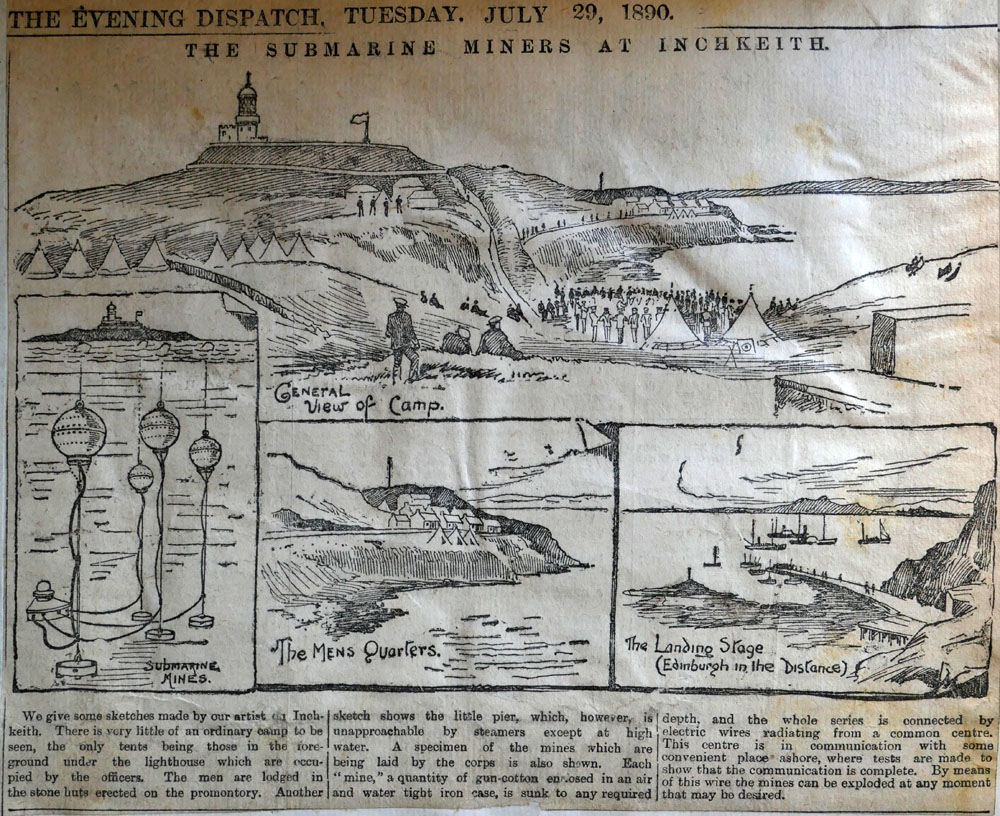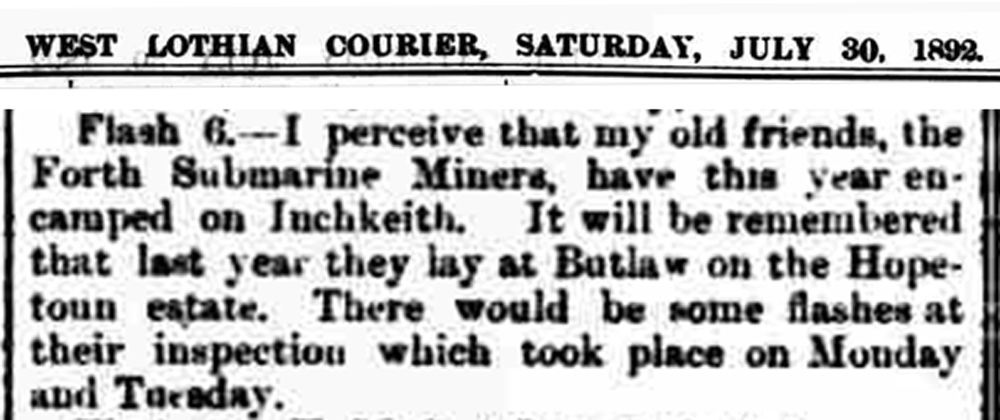1889 to 1891 – 2nd Camp on Inchkeith, Training at Chatham, First Company Song
| < 1888 – First Training Camp on Inchkeith | Δ Index | 1892 to 1897 – Inchkeith Camps > |
1889 Camp on Inchkeith
The 2nd annual Camp of the Forth Vol. Div. R.E. began on 20th July. This year we were favoured with better weather than last year although we had several rather windy days. The arrangements were much better and altogether we did more work and got better into the way of it than before. I passed my drill exam for my captaincy which I obtained and was promoted to the command of No. 1 Coy.
Major Ogilvie gave a silver cup to the corps to be won by the best drilled company. In the competition which was held on the 26th, Col. Malcolm awarded the cup to my company which behaved with more steadiness than the others. On the 3rd of August the Camp ended and we left the Island in pouring rain, having had a very enjoyable fortnight in which our skill in laying and raising submarine mines has been greatly increased.
1890 – saw the addition of a new steam launch

1890 – Training at Chatham
As I was prevented last year from going to Chatham to pass Part II in Submarine Mining, I arranged to make it out this summer. After practising diligently signalling and laying out, I left for Chatham along with Lieut. Stephen on 5th April (Sat).
After having some practice on Tuesday and Wednesday were examined on Thursday and Friday morning. We passed all right in the following subjects:-
1. Slinging
2. Laying out Electro Contact, Ground and Buoyant Mines on Fork and Line System
3. Picking up
4. Rowing
5. Sculling
6. Signalling Part II
In Signalling with the Flag I had two shots at it and on second trial passed fairly well, making only 11 out of a max of 14 mistakes allowed in a message consisting of alphabets signalled within 5 minutes.
Having now passed Parts I & II, I am entitled to have “P.S” put before my name in the army list.
Part III is optional and is chiefly on the electrical department of submarine Mining. I mean however to go up for it too, later on if I can.
Slinging refers to carrying mines and their associated sinkers, wire ropes and electrical cables on the sides of the mine-laying ship, using manila rope slings.
As well as Laying-out the individual mines when a minefield is first deployed, any faulty mines (the electrical connections from the shore station to each mine were tested daily) had to be picked-up and replaced.
This involved skilful boat handling. Each minelaying ship was accompanied by several small boats, which were used to make the electrical connections and perform the final positioning of each mine. Hence the need for rowing and sculling skills.
Submarine Mining Inchkeith 1890
The Camp on Inchkeith lasted from Sat 19 July till 2nd August.
The weather was dry but very windy and for several days almost nothing could be done in the water. I was not very well satisfied with myself with all our work and we were very much inconvenienced by the want of a decent harbour.
The War Dept. has never done anything towards making a decent harbour and a vast amount of time is lost in landing at low tide and in stormy weather from our steamers in boats.
One advance has however been made in the erection of stone huts for the men. The Officers have still to live under canvas but we shall get more permanent quarters later on.
As the Corps was in want of a submarine mining song I managed with the favour of the muse to compose a ditty which was sung with great applause at the Corps gathering in Junction Street Hall Leith on 28th February, and was printed for the use of the Corps.
A copy is given on opposite page alongside of a simple sketch of the Camp, with diagram of the mines and picture of harbour and mens’ huts.
This was the first of two submarine mining songs that Cadell wrote for the Corps.
1890 – The First Company Song
The Hundred Sappers
CORPS SONG, FORTH VOL. DIV. R.E., 1890
Chorus.- Wi’ a hundred Sappers an’ a’, an’ a’,
Wi’ a hundred mines in a raw, a raw ;
We’ll up an’ gi’e them a blaw, a blaw,
Wi’ our hundred Sappers an’ a’, an’ a’.
1. We ha’e steamed awa’ fra’ the Port o’ Leith,
An’ crossed the sea to the wild Inchkeith,
To fear the foeman awa, awa,
For a week an’ a bittock or twa, or twa.
2. Had the foe been by they micht weel hae fled
At the sicht o’ our fleet as it onward sped,
Wi’ its haik clamjamfrie o’ junction box boats,
Gigs, cutters, and Sappers wi’ braw red coats.
3. Our Corps contains about ten score men;
We’re few in numbers, but then, but then,
Gude gear gangs aye intil bundles sma’
An’ we’re nae exception at a’, at a’.
4. We can kep the foeman wi’ bowline lines,
Mak fast clovehitches about their throats,
An’ stopper their shankies to sinkers deep,
Whaur they’ll ne’er rise up to disturb our sleep.
5. At wide open order, in fours deep, deep,
Our Submarine warlocks they soom asleep,
Wi’ yin ee open, aye ready to jump,
Gin enemies middle them, bump ! bump ! bump !
6. Wi’ a fearsome bang, and a fell guffaw,
Like a muckle Scott Monument smoored wi’ snaw,
Ilk warlock flees up, gies a blaw, a blaw,
And dichts them like stour a’ awa’ awa.
7. Then here’s to the Sappers, hurra ! hurra !
Wha’ll fear our foemen awa, awa,
Gin they fash the auld lion that sleeps in the North,
An’ poke their nibs intil the Firth o’ Forth
H. M. Cadell.
Sketch of the Camp on Inchkeith 1890

We give some sketches made by our artist on Inchkeith. There is very little of an ordinary camp to be seen, the only tents being those in the foreground under the lighthouse which are occupied by the officers. The men are lodged in the stone huts erected on the promontory.
Another sketch shows the pier, which, however is unapproachable by steamers except at high water. A specimen of the mines which are being laid by the corps is also shown. Each “mine,” a quantity of gun-cotton enclosed in an air and water tight iron case, is sunk to any required depth,
and the whole series is connected by electric wires radiating from a common centre. This centre is in communication with some convenient place ashore, where tests are made to show that the communication is complete. By means of this wire the mines may be exploded at any moment that may be desired.
The 1891 camp
The 1891 camp was held at Butlaw South Queensferry, as revealed in this clipping from the West Lothian Courier of July 1892.

| < 1888 – First Training Camp on Inchkeith | Δ Index | 1892 to 1897 – Inchkeith Camps > |
top of page
